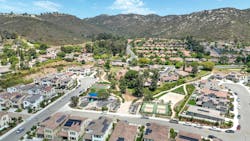State-funded wastewater recycling plant opens in California
The California State Water Resources Control Board joined representatives from the city of Escondido, San Diego North Economic Development Council, Escondido Growers for Agricultural Preservation, and design-builders Filanc and Brown and Caldwell on August 28, 2024, to dedicate an innovative water recycling plant.
The new Membrane Filtration Reverse Osmosis Facility was in large part funded by $45 million from the State Water Board.
The facility will produce high-quality, low-salinity water for nearby farms, transforming potentially wasted water into a valuable local resource, improving agricultural yield and building water-supply resiliency against increasing climate change impacts.
This facility is the first of its kind being used for agriculture in the state of California.
These efforts support Governor Newsom’s Build More, Faster agenda to deliver infrastructure upgrades across the state.
Escondido’s water comes from three sources: the Colorado River, Norther California via the State Water Project and local water from the watershed.
The new facility will provide a local source of water for farmers while leaving more drinking water available for homes and businesses.
With a maximum capacity of 2 million gallons per day, the new Escondido facility uses reverse osmosis, forcing water through a semipermeable membrane to remove contaminants.
The processed water is then blended with the city’s other supply of recycled water and pumped to nearby farms, primarily avocado growers who serve a vital role in Escondido’s economy.
The State Water Board’s Division of Financial Assistance provided approximately $45 million of the facility’s projected $64 million total cost through a variety of funding sources, most of which were low-interest rate loans at 0.9% including:
- A Clean Water State Revolving Fund loan for $24 million
- A Water Recycling Prop. 68 loan for $17 million
- A Water Recycling Prop. 1 grant for $3.4 million
